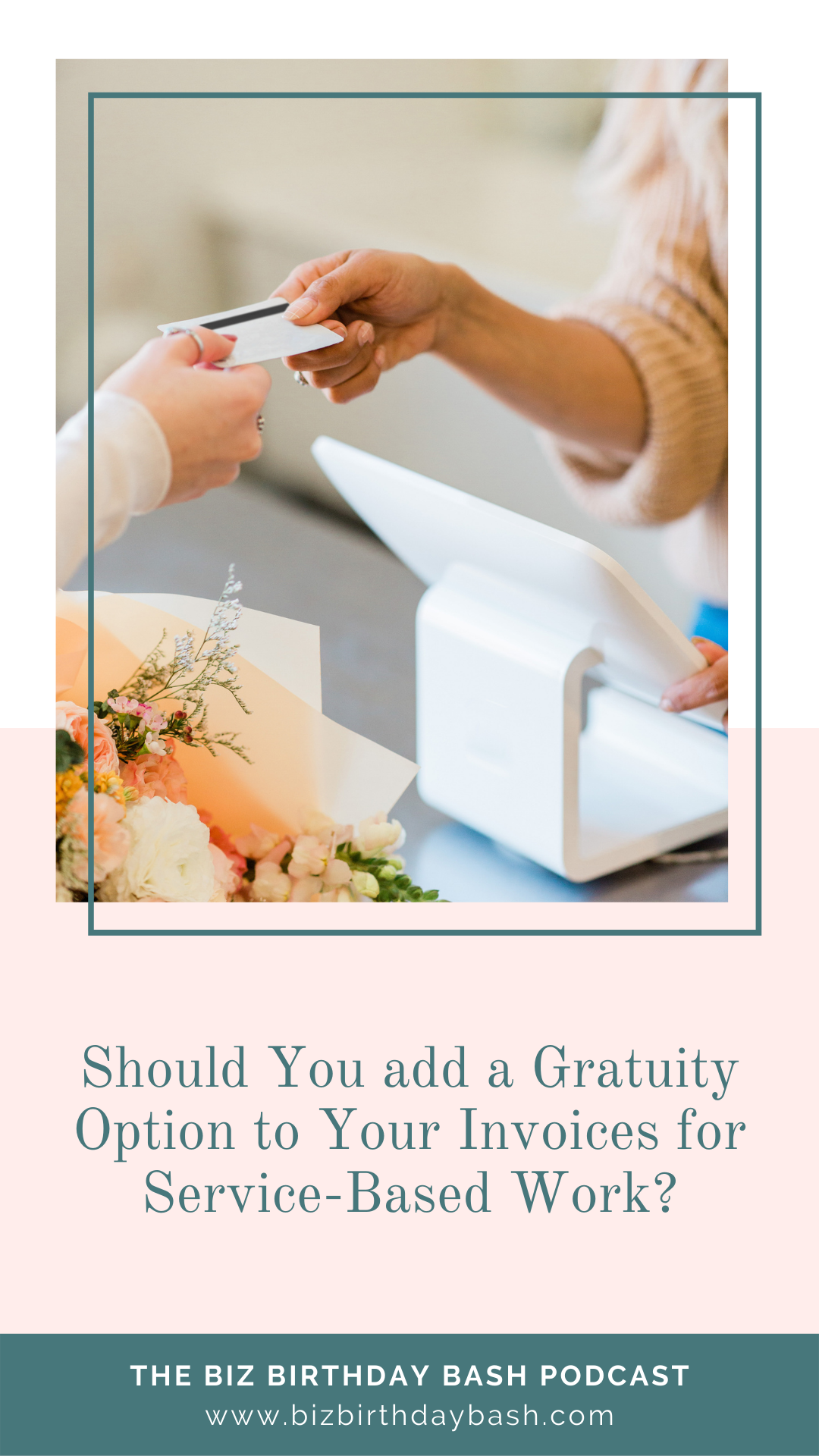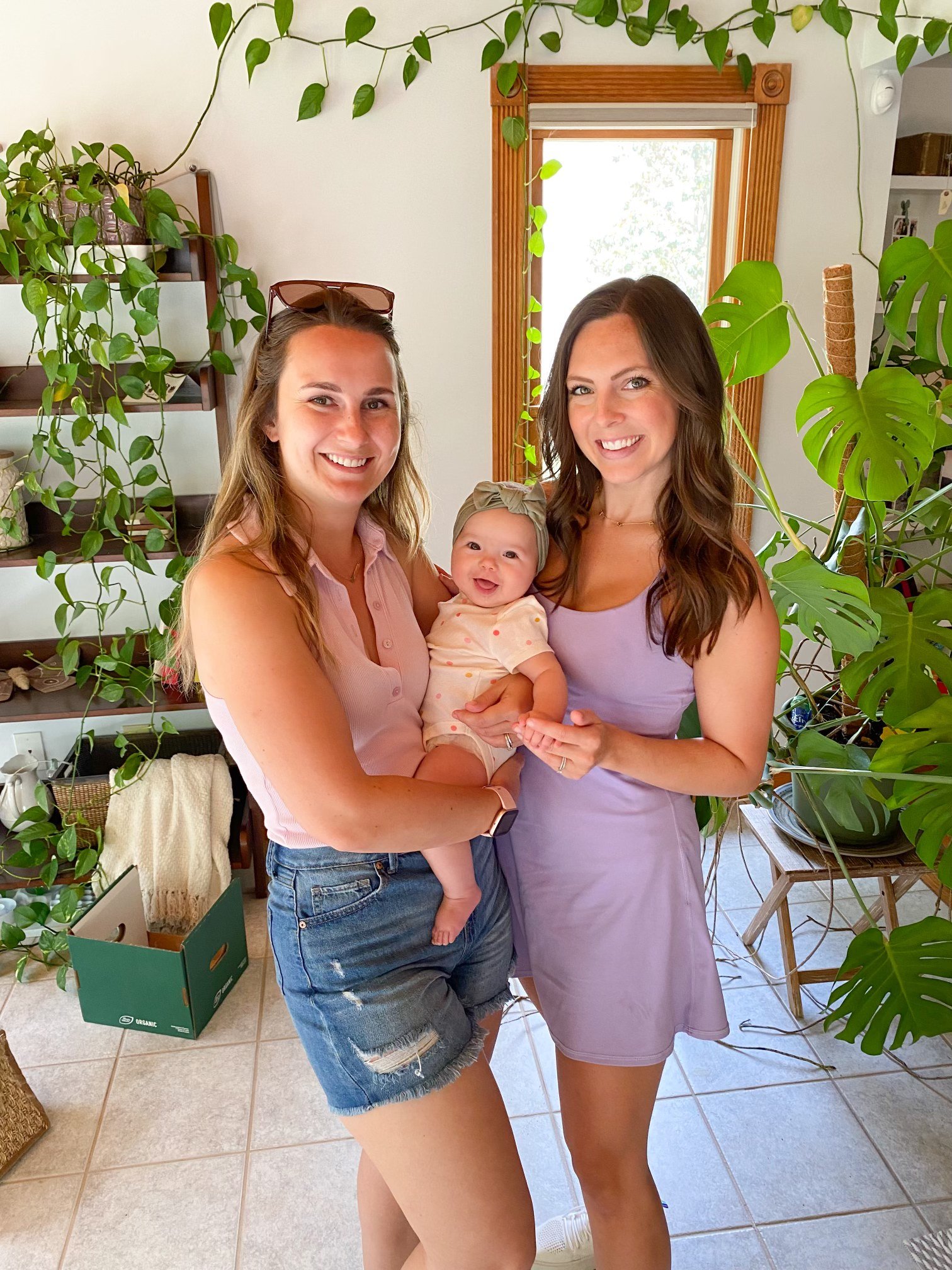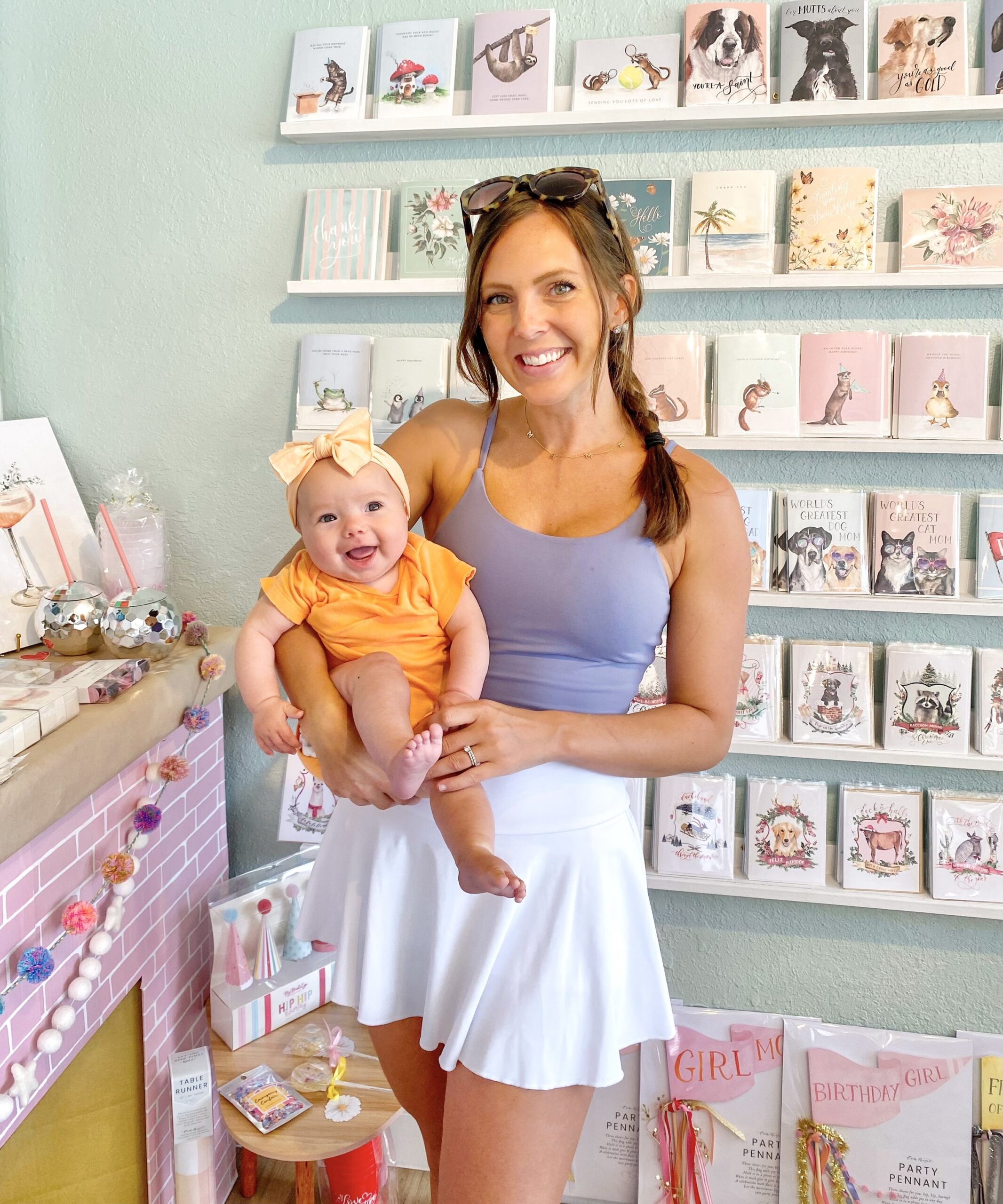Wondering if you should allow your clients the option to add a tip to their payments? If so, you’re in luck with today’s episode! Elisabeth and Holly are weighing in on this topic, specifically for service providers who use Dubsado or Honeybook which both have gratuity features. They’re diving into tipping “best practices” that they’ve observed in the wedding industry. Plus, they’re unpacking their preferences for gratuity options as consumers in various industries.
Let’s be friends! Find us on Instagram http://instagram.com/bizbirthdaybash @bizbirthdaybash.
Grab your FREE Training — 4 Essentials You Need to Turn Your Biz into a Profit Party: https://bizbirthdaybash.com/free-training
Where does the expectation for gratuity originally come from?
Elisabeth [2:28] I think this gratuity is like very much like an American thing.
Like if you go to Europe, they’ll look at you. Like you’re crazy. Like, yeah. Yeah. They’re basically like paid what they should be paid for their like service position. And here, I feel like it kind of started as potentially like in the restaurant industry or the food industry where it’s someone is making wages like a very low, hourly wage in the way that that is compensated is through tips that they’re receiving so that allows them to make a living. I don’t understand the legality of that fully.
Holly [3:08] When you spell it out, it sounds so weird. Like we’re not paying you enough, so you have to rely on other people’s generosity in order to make a living. And you’re like, wait, what? Yeah. And so it’s like a very odd, like American-specific thing.
Overall, is this a standard in the wedding industry and why is it a standard?
Elisabeth [5:50] I remember when planning my wedding. Like, and I was very fortunate that my mom did so much of it. So she was kind of like heading up a lot of that stuff. But then when she told me at the end of the day, like, oh, I have to make sure, like on the day of the wedding to bring such and such like money for tips for these vendors.
Shocked, I guess I was like, wait, what? Like you guys put how much money into the wedding? And then like, you’re also being asked, like the wedding planner basically said she was like, okay. And you like, bring tips for like this, this and this person, which I guess had confused me because I think there was that aspect of like, okay, well, if all of these people are like running their own businesses to some degree, like why isn’t that built into the pricing.
Holly [6:40] So I felt the same way. Like I think we tipped. The one that kind of like blew my mind a little bit, I think was like the florist. And I was like, wait, we paid, please. If any florists are listening, please don’t come at me. It’s, it’s just like, we paid for a service and we paid for the flowers and everything.
And like part of the service was you coming to the wedding and setting up, like, you didn’t interact with anybody probably other than like other vendors. And like, that was just kind of it. I don’t know, it’s kind of like going to get your car repaired and like tipping them. It’s just like, it’s all rolled into that.
Right. But then at the same time, I remember tipping them because first of all, they were lovely people, and we kind of made friends with them along the way, but also like, They dealt with a lot of stress that day. You know, there’s a lot of stress in like loading and unloading and as plans change always, you know, they expect to go to a certain place and like it’s never available.
So like they have to drive around or like go somewhere else. And so there’s a lot of like extra stuff going on. And I think the tipping really kind of lets them know like you did, you like went above and beyond. You did a great job. We so appreciate you. It’s not like. I’m tipping you because I have to, it’s like I’m tipping you because I think that you did an excellent service and I really appreciate you above and beyond what you’ve already charged me.
Elisabeth [8:06] Yeah. I definitely, I definitely like it in the regards of like, If you feel like that above and beyond, like effort has been made. And that’s also, I guess, hard to plan it advanced sometimes like for the wedding day, like, how am I going to handle this like tipping vendors or like not tipping vendors.
I think that that potentially puts more stress on the clients. I know it put more stress on my mom trying to remember like the details of like, who gets tipped, what, and like how all of that works. And so like, Having a business model where some of that is like built in a little bit, never hurts. I dunno.
Know your pricing. Are you charging accordingly? Recently my hair stylish implemented a “no tips” policy because she works for herself and has that built into her pricing
[13:05] Elisabeth I think something that like changed my mentality in this so much was actually. Recently where I went to my hairstylist and she’s changed her pricing structure a little bit. And she basically was like, I no longer accept tips.I run my own business. I set my prices. I’m not like controlled by somebody above me until like, what you’re paying is like the price that I have set and what I need to like, keep my business running. And she said that like generationally some of her that has confused, like some of her older clients a lot.
They’re like, wait, like, what do you mean? Or. Yeah, I don’t get it. And for me I’m like, oh, this is such a relief. Like I don’t overthink the study more or feel awkward or weird when I’m doing this. Like, I’m paying you what you want. And I know that that like sustains you basically. I don’t know if it’s, if it’s like a generational, like, shift in like, mindset, but it’s like, I’m not opposed to people asking for tips. And I’m not telling people that they shouldn’t like to have that as an option, because I think you should have it as an option because there are people that will do it.
[14:26] Holly I don’t know why I immediately thought of this, but I kind of got a little like, oh, I don’t know how I feel about that because what if I don’t like the service that you gave me? And like, my tip is now aren’t automatically in there. What if I was only going to give you 15% instead of 20, you know, it’s kind of like when you go to a restaurant and they’re like, well, there’s 10 of you.
So we’re going to charge you 18% or 25. Gratuity automatically. And you’re like, well, I don’t know what kind of service I’m going to get because of that, because now this server is just guaranteed this and they’re not going to try maybe to like, you know, really like refill the wine or like get our food out super quick or whatever, like pitches.
You have to be really careful. I think with that, just for that reason, like, you don’t want to, like, that’s a great thing that you don’t accept tips because that takes a lot of pressure off of the customers as you said, but you also don’t want to offend anybody. That’s like, wait, wait, wait, wait, you included my tip in your pricing.
Like, um, I’m not okay with that. Like how much extra are you patting this way? You know, expecting that I’m going to tip you this at the end. So it’s kind of like a weird, a weird line to walk, you know? Because I like both of those options, they just both have downsides and positives.
[15:44] Elisabeth As, as with everything in life, there is a bit of a pro and con and to be fair, like I’ve been going to this girl for like years.
So I like knowing that she’s not going to like butcher my hair or. And I think for her, it’s like, as she’s growing and scaling, like her hairdressing business, she’s like, you know what, I know what my time is worth. And I need to be like charging accordingly and not charging. If she was in a salon working for somebody else, they dictate the pricing.
Right. And she has no-decision in how that’s dictated the same as like a waiter who works within like, even a fancy restaurant. Like those prices on the menu are dictated by someone else. You don’t have a decision over that. And so that is the tip is given directly. To you when you’re not in control of like, what else has been charged, I guess.
Um, so yeah, it is like, it is kind of funny cause I am able to see it. Like both ways, but I was like, kind of like excited for her, I guess I was like, oh, that’s kinda like cool that you’re doing something different. And she’s trying to think a little more long-term and it helps her budget so much better
Do we recommend adding gratuity options to your invoices?
[22:19] Holly So, yes please keep the gratuity options on your invoices. I really do like the way Dubsado and HoneyBook do it because the option is like very small and like it’s out of the way and it’s unobtrusive and you don’t feel like you’re like waving your arms in front of somebody’s face like please tip me. It’s more of a like, Hey, by the way, this is just something extra, please don’t feel obligated to do this. Just press the, no, thanks, and move on. Like we’ll never know kind of thing.
I think the gratuity thing is it’s kind of all in how you ask, like, you know, you’re obviously not going to ask somebody if you’re not working with like a client management system of some kind, like at the end of your delivering the invitations.And you’re like, now here’s a receipt, please sign and leave a tip. Thanks.
Ultimately, we encourage you to put the gratuity option on your invoices, but if you don’t want to do it, it’s not like nobody’s expecting you to do this. And the industry isn’t expecting you to do this.This isn’t like an industry-standard thing.
I think that invitations, especially, it’s not like, like a thing, like when you have a planner, you tip them. That’s like a bunch of hours of their day or their life basically. And like they’re, they’re dealing with guests and drunkenness and all of that stuff. So like, I think that they like to deserve a tip, but like invitations were not there on the day of we’re doing everything kind of behind the scenes.
So it’s kind of like, how were your interpersonal skills with your clients? I think that’s going to dictate. Gratuity and tipping and things like that rather than like an in-person kind of service. So I think that’s where a lot of that, like you itchiness kind of comes from, is that we’re not usually directly like in-person involved with the clients. So for us, gratuity is not as much of a necessity as it is for vendors that are there on the day of the wedding.
[24:49] Elisabeth Like all of it comes back to like your original pricing and that you need to make sure your pricing allows you to pay your expenses and make a good living. And then. you can look at any gratuity as an added bonus.








+ show Comments
- Hide Comments
add a comment